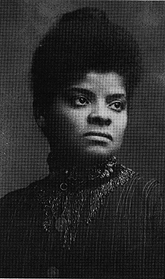
Ida Bell Wells-Barnett
July 16, 1862 - March 25, 1931
Astonishing Lives

Ida Bell Wells-Barnett
July 16, 1862 - March 25, 1931
Astonishing Lives
Whereas I once rapidly glanced at obituaries to see if I recognized a name, I now find myself reading them more closely, intrigued by the stories accompanying the names.
Some individuals have raised large families; some served with distinction in war; some have been the mainstay of community organizations. There are youth whose few years leave little to be said other than words straining to express family grief. At times, I pause and allow others' accomplishments to enter deeper into my consciousness. These join so many others who will not be even footnotes in the human enterprise.
Some do become footnotes. Horrified by the mob of white men who had dragged her friend Tom Moses from jail (where he had been placed for wounding a white man in self-defense), lynched him, and then peppered his hanging body with bullets, Ida B. Wells-Barnett of Memphis, took action. The year was 1892, and following the lynching, whites began randomly shooting into groups of blacks, killing and wounding some.
She saw it for what it was: a way of frightening and controlling. So, she wrote feature articles telling black families to leave a town that held, for them, no fair trails, no guns to protect themselves, and no future. She told fellow blacks to stop shopping in the city's white-owned stores and to stop riding the city's street cars. She advised them to save their money and move west. With storeowners losing money and no black servants cleaning houses and sweating over hot stoves, it took only six weeks of boycott for the managers of the Memphis streetcar company and the business community to come and beg Ida to stop the boycott and stop the exodus.
Her life closely parallels that of another Drum-Major-for-Justice, Martin Luther King, Jr. Beginning with a bus boycott and then going national, Ida gave speeches, wrote newspaper articles, and helped organize groups, including the NAACP.
Next, there is the story of Nancy Kelsey, the first 'American' woman to set foot in California. Married at 15, she was strong and capable: surviving a harrowing journey across the uncharted Great Plains and Rocky Mountains, shooting and skinning deer, making clothes, helping plant fields, giving birth and raising children, and driving teams of oxen.
A bit more notable is Ernest Shackelton who, in 1914, set out for Antarctia. For ten months the crew lived on their dying ship, caught in and then crushed by the ice; for five and half months they drifted on an ice floe; for one interminable week they fought the sea to land on a never-before-visited outcropping of rock. Then, leaving twenty-six men on the rock island, Shackelton and five others headed out on the vast south Atlantic in early winter in a boat not much bigger than a bathtub in search of an inhabited island 400 miles away. Unbelievingly, they found the island, then sailed back for the other men. For two years, this expedition battled the elements in a saga that nearly defies description, and amazingly, not a man was lost. Headlines from the First World War eclipsed this absolutely amazing journey.
This week I talked with a person who is on, what is for him, an uncharted and dangerous journey. He finds himself in the world of cancer. Absent the scope or the drama of Wells-Barnett, Kelsey and Shackelton, nevertheless, he, too, is part of that magnificent tenacity of the human spirit that is so characteristic of humans facing injustice, the need for exceptional physical endurance and the abyss.
Self-help, positive-thinking books do not point their readers to
these stories of endurance and courage, and to the obituary section of
the newspaper. Yet, for me, mingled in with raw life, I find inspiration,
hope and genuine joy.